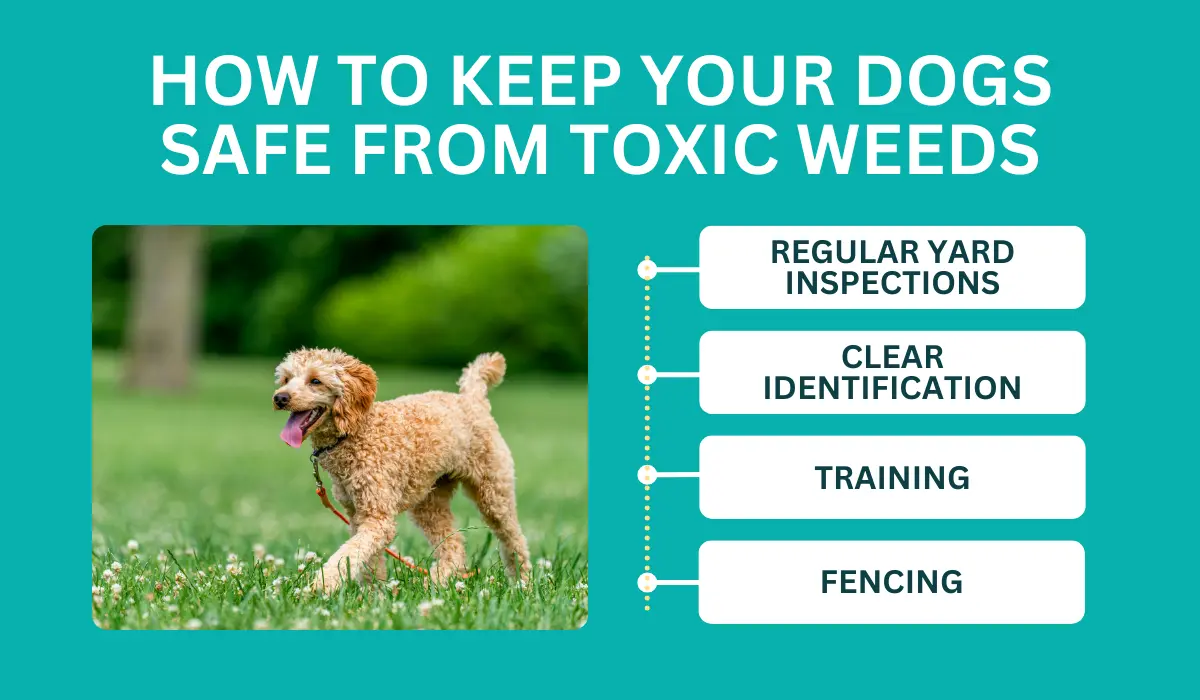What Florida Weeds Are Poisonous for Dogs?
Florida's lush environment is a playground for many dog owners, but it also harbors a range of poisonous weeds that can harm your furry friend.
Knowing which weeds are poisonous to dogs can keep your pet safe during outdoor adventures. From the common Lantana to the ominous Oleander, these houseplants are more than just a nuisance.
To ensure your dog's safety and well-being, keep reading to learn which specific weeds to avoid and how to identify them.
Key Takeaways
- Oleander, Sago Palm, and Lantana, pose serious health risks to dogs, and they can cause severe or even fatal reactions upon ingestion.
- Protecting dogs from toxic weeds involves regular yard inspections, training dogs with commands and using barriers to restrict access to dangerous plants.
- If a dog ingests a poisonous plant, immediate actions include removing plant matter from the mouth, possibly inducing vomiting if a vet advises, and seeking professional veterinary help.
- After exposure to toxic plants, dogs should undergo regular veterinary check-ups to monitor for signs of ongoing health issues.
Common Poisonous Weeds for Dogs in Florida
Dogs in Florida often encounter various types of weeds outdoors, many of which can be harmful if they ingest any part of the plant. Hence, knowing which plants pose the most significant risks to your furry friends becomes crucial.
Highly Toxic
Highly toxic weeds can cause severe health issues or even be fatal to dogs. Such plants contain dangerous chemicals that can severely affect a dog's vital organs.
These common highly toxic weeds should be avoided:
Weeds | Distinguishing Features |
Oleander | Dark green leaves, white or pink flowers |
Sago Palm | Feather-like leaves, small orange-red seeds |
Castor Bean | Large, glossy leaves, spiky seed pods |
Lantana | Small clusters of red, orange, or yellow flowers |
Foxglove | Tall spikes of tubular purple or pink flowers |
Gloriosa Lily | Curled red and yellow petals, vine-like stems |
Dumb Cane | Dieffenbachia spp., large, variegated green leaves |
Lily of the Valley | Small, nodding white bell-shaped flowers |
Nightshade | Tiny white or purple flowers, green or red berries |
Cardboard Palm | Stiff fronds, brown, rough surface stems |
Chinaberry | Light green leaves, small lilac flowers, yellow berries |
Chinese Lantern | Papery orange-red husks resembling lanterns |
Moderately Toxic
While not immediately lethal like the highly toxic ones, these weeds can still cause significant health issues. Symptoms can range from digestive problems to more severe organ damage.
Plants falling into this category include:
Weeds | Distinguishing Features |
Azalea | Bright, vibrant flowers in various colors |
Easter Lily | Large, trumpet-shaped white flowers |
Calla Lily | Elegant, trumpet-shaped flowers |
Amaryllis | Large, trumpet-shaped red or pink flowers |
Pothos | Heart-shaped, contrasting green or yellow leaves |
Milkweed | Clusters of pink or orange star-shaped flowers |
Philodendron | Large, glossy, heart-shaped leaves |
Caladium | Colorful, heart-shaped leaves with veins |
Tulip | Brightly colored, cup-shaped flowers |
Bird of Paradise | Stiff, paddle-like leaves, orange or blue flowers |
Coontie | Pinnate leaves, resembles a small palm |
Poison Ivy | Three almond-shaped leaves, glossy with a red stem |
English Ivy | Glossy, dark green leaves, often with pale veins |
Japanese Knotweed | Bamboo-like stems, oval green leaves, white flowers |
Mildly Toxic
Mildly toxic weeds can lead to discomfort or minor health issues for dogs. These plants generally cause irritation or mild digestive symptoms when ingested.
Common mildly toxic weeds include:
Weeds | Distinguishing Features |
Peace Lily | Glossy green leaves, white spathe flowers |
Jade Plant | Thick, fleshy, oval-shaped leaves |
Elephant Ear | Large, broad leaves shaped like elephant ears |
Spurges | Milky sap, small greenish flowers |
Wisteria | Climbing vines, drooping clusters of purple flowers |
American Pokeweed | Large leaves, dark purple berries |
Daylilies | Strappy leaves, trumpet-shaped yellow or red flowers |
Dracaena spp. | Long, narrow leaves with red or yellow edges |
How to Keep Your Dogs Safe from Toxic Weeds

Keeping your dog safe starts with a good understanding of toxic weeds. To protect your dog from toxic weeds, consider the following tips:
- Regular Yard Inspections: Check your yard for any new or unfamiliar plants.
- Clear Identification: Use the University of Florida's IFAS resources to identify and remove toxic weeds.
- Training: Teach your dogs commands like "leave it" to prevent them from nibbling on plants.
- Fencing: Install barriers around known toxic plant areas to limit your dog's access.
What to Do If Your Dog Eats a Poisonous Plant
If your dog ingests a poisonous plant, swift action is necessary. They may show signs such as vomiting, diarrhea, or abdominal pain. It's essential to keep these steps in mind:
Remove Plant Matter: Remove any remaining plant parts from your dog's mouth.
Induce Vomiting: Only if instructed by a vet or animal poison control.
Contact a Vet: Contact a veterinarian or animal poison control immediately. The ASPCA's Animal Poison Control number is a reliable source.
Provide Symptomatic Treatment: Administer activated charcoal if advised, or make your dog comfortable while awaiting professional help.
Keep Tabs Long-Term
After initial treatment, continuous long-term health monitoring is crucial to catch signs of more severe issues, such as liver failure or abnormal heart rate.
For effective long-term monitoring:
Regular Veterinary Check-ups: Frequent visits to assess liver function, heart rate, and overall health.
Watch for Symptoms: Look for signs like lethargy, persistent vomiting, or changes in appetite, which might indicate ongoing issues.
Avoid Re-exposure: Ensure no access to poisonous weeds and known toxic plants, such as chives, leeks, or tomato plants, that contain harmful alkaloids.
Maintain a Safe Environment: Observing proper weed control creates a dog-friendly space where small children and pets can't access potentially harmful plants.
Is It Time to Call a Lawn Care Expert?
If your dog has been showing symptoms like vomiting, drooling, or lethargy, and you suspect poisonous weeds in your yard, it's time to consult a professional lawn care company (like us at Native Pest Management).
Identifying toxic plants isn't always straightforward, and as lawn care experts, we can help identify and safely remove these hazardous weeds.
